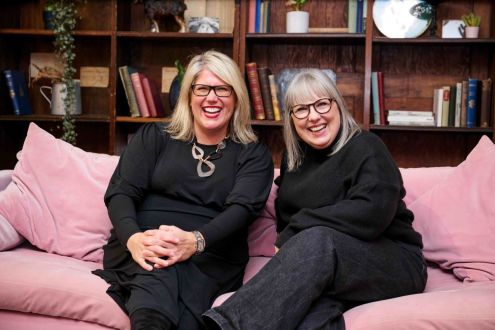What’s the point of having therapy?
Therapy is becoming more accepted as a way of gaining insight into what makes us tick . But how does it work? Psychotherapist and Psychologies’ advice columnist Lucy Beresford explains what really happens ‘on the couch’

We all have a method for staving off colds, or treating wasp stings, but what do we do when we can’t stop crying? Or find life utterly joyless? When we suspect we might be drinking too much, too often? Or secretly watching porn at work? When our parents have upset us, yet again? Or life seems increasingly out of control? People from all walks of life are propelled into therapy for a variety of reasons.
Over the past 20 years, attitudes in Britain towards having therapeutic treatment for our mental health have changed. And with so many pop stars, sportspeople, TV personalities and It-girls beating a path into rehab, having therapy no longer carries the stigma it once did.
But what, exactly, is this thing called therapy that we are hearing so much about? And, more importantly, might it help you? The first thing to say is that therapy isn’t a cure. It won’t make your life perfect and you won’t discover permanent happiness. And that’s because those things don’t exist, so chasing them is unrealistic and can lead to greater unhappiness or disappointment. In this regard, therapy is often about coming to terms with reality, which includes acknowledging that life cannot be lived on a permanent upward trajectory, nor can it be lived in an emotional vacuum. So therapy won’t work miracles, but it can do many other things.
It can boost self-esteem, untangle emotional dilemmas, provide support during grief or trauma, facilitate the discovery of courage to face the world again after illness, divorce or loss, or ignite a spark of existential thinking about one’s place in the world. It can’t, sadly, give us the physique of a ballet dancer or the sporting skills of a Spanish footballer. It can’t take us back in time to prevent abuse or family breakdown. But it can help us better process our emotions and (particularly in psychotherapy) unpick unhelpful patterns from our past that are still tripping us up in the present.
One size doesn't fit all
Therapeutic options in the UK today include psychoanalysis, psychotherapy, cognitive behavioural therapy (CBT), life coaching, hypnotherapy, brief counselling or even laughter therapy. The first two, for example, will delve deeply into our dreams and unconscious, whereas CBT will seek to break negative patterns of thinking. Coaching or mentoring may identify what is holding us back in our career. It’s worth remembering that achieving mental wellbeing is not like healing a physical complaint, where often one method suits all bodies. We are each of us different personalities, and we arrive at seeking therapeutic help at stages relevant to us.
Therapy is a deeply personal relationship, and finding the right therapist for you is the vital component of the healing process. As the philosopher Martin Buber once said, ‘The healing is in the meeting’. What he meant was: it doesn’t really matter what orientation your therapist follows, whether they are the same gender, age or nationality as you, whether you have one single session or end up seeing a therapist once a week for 20 years – what works arises from what happens between the two people in the room. Remember how it was at school when you clicked with a teacher? When we engage with a guide who inspires us, we learn without really trying.
We human beings are very imitative creatures. Often what the therapist is modelling is an alternative, non-judgemental way of operating in the world that we can absorb and copy. We feel heard and understood and, in that safe place, we start to heal and grow. I always advise people who are looking for a therapist to ‘shop around’ and try out a couple of therapists, if they can. Most therapists are used to the idea that prospective clients want to find the most suitable person. The most effective way to do this is to set up a preliminary meeting with a therapist, usually for an hour, so you can meet face to face. Like most interviews, it’s a mutually beneficial opportunity for each side to get an idea of whether they will be able to work with the other.
Finding the right time
This meeting, of course, pre-supposes that you want to be in therapy in the first place. It can happen that people feel obliged to be in therapy, because a spouse insists or because others are saying you have a problem you can’t acknowledge. It’s fair to say that in these cases, therapy rarely helps. Timing is everything. You need to want to be in therapy and be prepared for the sometimes painful self-examination required, to get the most out of it.
And I reckon that our subconscious always knows when we’re ready for therapy. We might have been mulling over a dilemma or a difficult relationship situation or an episode from our past for perhaps years. But something will happen – we’ll have a chance conversation, read a random article, hear an item on the radio – and suddenly feel motivated to do more than just think about it. Admittedly, some people enter therapy as a result of a crisis. They might not have considered therapy before, and in some cases have been self-medicating, perhaps with drink, sex, drugs, or denial, until such a coping strategy collapses. And in the midst of a crisis, we don’t necessarily have the luxury of ‘interviewing’ prospective therapists over a period of time.
But in the UK, therapists must be registered with various professional bodies. This ensures that an approved therapist has undergone a lengthy and rigorous training process, which has included having therapy. This means that every UK therapist will know just what it’s like to stand on the daunting threshold of committing to therapy.
Therapy is very much a process of stepping into the unknown, but the benefits in terms of improved self-esteem and a fulfilling life make it arguably the most momentous step you’ll ever take. As Mark Twain wrote: ‘Twenty years from now, you’ll be more disappointed by the things you didn’t do than by the ones you did.
So throw off the bowlines. Sail away from the safe harbour. Catch the trade winds in your sails. Explore. Dream. Discover.’ Therapy can accompany you on that courageous journey.








